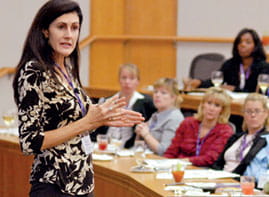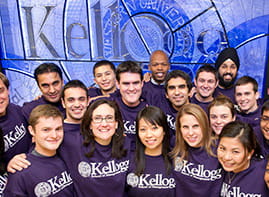While the White House chips away at healthcare reform, the role of government in medical technology takes center stage at the MacEachern Symposium
11/4/2009 - As the healthcare reform debate rages on, leading practitioners and academics at the MacEachern Symposium on Oct. 30 focused on the role of government in medical technology.
Speakers at the symposium also discussed supplier views on technology evaluation, the policy implications of healthcare reform and forecasts for the U.S. healthcare system, among other topics.
A centerpiece of the symposium was the Malcolm MacEachern Memorial Lecture, delivered this year by Joseph P. Newhouse, the John D. MacArthur Professor of Economics at Harvard University. Newhouse’s talk concerned “comparative effectiveness research,” a government-funded research project that compares clinical treatments used to improve the health of patients.
Comparative effectiveness research seeks to remedy the problem that “much of what physicians do has not been evaluated,” said Newhouse. “But there is a reason why much of medicine has not been evaluated — it is hard to do.” He explained that neither method for conducting comparative effectiveness research — one based on observational data, the other deriving information from randomized controlled trials — is without flaw, and that testing can be costly and time-consuming.
While the $787 billion economic stimulus bill designated $1.1 billion for comparative effectiveness research, Newhouse believes more funding is needed.
“Given the $2.5 trillion we spend on healthcare, if CER saved 1 percent of patients, we are talking about saving $25 billion,” he said. “It’s not hard to think that it would be worth the money.”
At the lunchtime forecasting panel, Dave Burda, editor of Modern Healthcare, moderated a panel of healthcare experts who discussed current issues in healthcare and speculated on changes to come.
One of the panelists, Maureen Sullivan, senior vice president of the Blue Cross Blue Shield Association, noted the emergence of a health insurance payment model called “pay-for-performance.” Within this model, healthcare providers are rewarded for meeting pre-established performance measures in quality and efficiency. “I expect this to be one of the largest areas of activity,” Sullivan said. “We are already seeing providers talk about different ways to structure payment so we are paying for the right treatment at the right time.”
Another growing area of focus is prevention and wellness, noted Sullivan. “The number of obese Americans now exceeds the number of healthy-weight Americans,” she said. “Health plans are realizing that they have a role in providing incentives to providers for prevention and education.”
Michael Sachs, chairman and CEO of healthcare intelligence company Sg2, said that he has observed “a subtle shift in the composition of the health industry. There is a significant consolidation in the delivery, payment, pharma/biotech side of healthcare across almost every market in the U.S. [These] ‘clinical enterprises’ are an amalgam … and they have significant scale.”
Healthcare organizations are also beginning to invest resources in patient safety. “It’s sad news that it’s new news,” said Jim Skogsbergh, president and CEO of Advocate Health Care. “It’s a criticism of the way we’ve practiced medicine. Healthcare organizations are now focusing on measurable data instead of [relying on] how they were trained or taught. It is a wonderful movement in the industry.”
The MacEachern Symposium is named after Dr. Malcolm T. MacEachern, a Canadian physician who devoted his career to improving the standards of quality in medical care delivery. In 1943, he founded Northwestern University’s hospital administration program, which today exists as the Kellogg School’s Health Enterprise Management Program. Twenty years after his death in 1956, graduates of the program created the Malcolm MacEachern Lecture in MacEachern’s memory. The lecture evolved into a full-day symposium in 1983.
David Dranove, the Water J. McNerney Professor of Health Industry Management and director of the Health Enterprise Management Association (HEMA), invites all alumni interested in health care or biotech to join “HEMA Now.” Visit http://kelloggalumni.northwestern.edu/Affinity/hemanow/">for more information.





